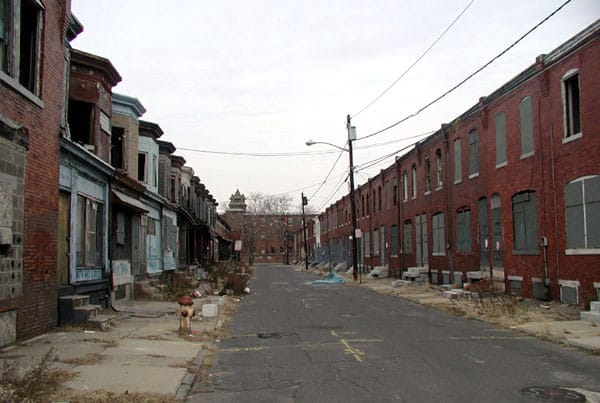Camden NJ, Most Dangerous City in US, to Close Police Dept

Camden NJ poverty. Credit: commons.wikimedia.org

The perennially ailing city of Camden, NJ is closing its entire police department and plans to replace it with some type of county policing, although the specifics remain nebulous. The State of New Jersey has managed the police force (and school system) of this beleaguered city since 2005 and the agreement expires soon. Forty percent of its residents live below the poverty line. It has a high crime rate. Some say it is the most dangerous city in the country.
The problem, of course, is budgetary. Camden simply does not have the money to continue to fund the police department. The recession has shrunk its already small revenues while public pension liabilities soared. New Jersey Governor Christie and others favor shutting the Camden police department then transferring about half its existing employees to a new county Metro Division, which would be non-union.“This is definitely a form of union-busting. This method is unproven and untested, to put your faith in an agency that doesn’t even exist,” says Camden Fraternal Order of Police President John Williamson.
Those who believe that public union benefits are too high and applaud breaking their power also understand that Camden may not be an outlier, an isolated instance, but rather a harbinger of things to come for American cities, and that this does not bode well for our nation.
non-union alternative for public employees
Training for the reassigned officers will take several months. What happens to Camden in the meantime? The city has already laid off large numbers of police. During the transition period there will be even fewer police patrolling already perilous streets.
Gov. Christie says the new plan will save substantial amounts of money and put more police on the streets. Under the proposed agreement, police departments in eight surrounding areas will somehow have to police Camden now in addition to their own areas, using their money, time, and resources, something that concerns them. At a recent planning meeting, eight police chiefs walked out in protest after a police chief in an area not adjoining Camden was refused entry. Yet these are the same police chiefs who will need to work with Camden to protect that city.
It is difficult to see where the funding for the Metro Division will come from or how it will result in more police on the streets of Camden. Instead, nearby municipalities will apparently fund it themselves, with perhaps some help from the state. However, will the residents of Camden be any safer as a result?


